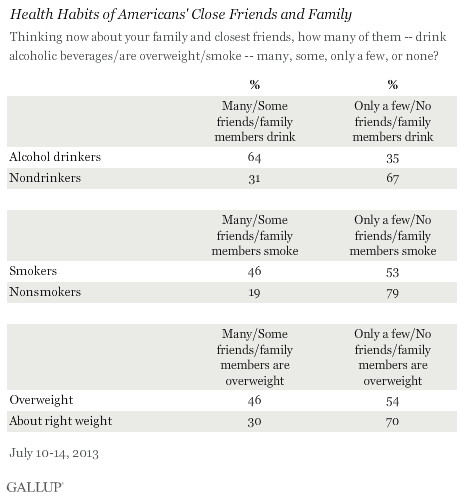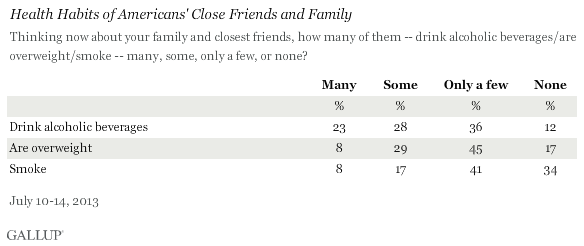WASHINGTON, D.C. -- Americans who smoke or drink are much more likely than those who abstain to have close friends and family who share their habit. Smokers, for example, are more than twice as likely as nonsmokers to say their circle of family and friends includes some or many smokers. In the same vein, 46% of adults who self-identify as overweight, vs. 30% of those whose weight is "about right," say they have some or many overweight friends.

These data, from Gallup's annual Consumption Habits survey, conducted July 10-14, conform with the theory researchers have put forth in recent years that people's social networks influence their health. A leading expert on the topic, Dr. Nicholas A. Christakis of Harvard Medical School, is exploring "the spread of health behaviors" within social networks. He and his team discovered that "obesity may spread in social networks" -- so when individuals gain weight, others in their networks tend to do so as well.
Nearly Four in 10 Have Some or Many Overweight Friends, Family
Americans, regardless of their own use of alcohol, are most likely to have some or many friends and family who drink alcoholic beverages. This is probably because most Americans drink; 60% say they drink alcohol at least occasionally. Americans are less likely to describe themselves as overweight (45%) or to say they smoke cigarettes (19%).
Overall, nearly four in 10 Americans say they have some or many friends and family who are overweight. Another 45% say they have only a few who are.
And 25% say they have some or many friends and family who smoke. However, a third of Americans say they have no friends or family who smoke, more than say so in regard to drinking and being overweight.

Bottom Line
When it comes to health habits, Americans tend to associate with others -- friends or family -- who are like them. Those who are overweight are more likely than those who aren't to have overweight close friends and family. The same is true for those who smoke and drink.
Whether Americans pick up their health habits from friends and family, or are seeking out others like them, isn't clear from these data. It could certainly be a combination of both factors. Research from others such as Christakis tends to suggest that people may in fact be passing on their health habits or health situation to others.
Still, while the causal link remains unclear, Americans would be wise to be mindful of the health habits of their social circle, and how these might be influencing their own behavior.
Survey Methods
Results for this Gallup poll are based on telephone interviews conducted July 10-14, 2013, with a random sample of 2,027 adults, aged 18 and older, living in all 50 U.S. states and the District of Columbia.
For results based on the total sample of national adults, one can say with 95% confidence that the margin of sampling error is ±4 percentage points.
For results based on the total sample of 338 smokers, one can say with 95% confidence that the margin of sampling error is ±6 percentage points.
For results based on the total sample of 1,259 adults who drink, one can say with 95% confidence that the margin of sampling error is ±3 percentage points.
For results based on the total sample of 921 adults who describe themselves as overweight, one can say with 95% confidence that the margin of sampling error is ±4 percentage points.
Interviews are conducted with respondents on landline telephones and cellular phones, with interviews conducted in Spanish for respondents who are primarily Spanish-speaking. Each sample of national adults includes a minimum quota of 50% cellphone respondents and 50% landline respondents, with additional minimum quotas by region. Landline and cell telephone numbers are selected using random-digit-dial methods. Landline respondents are chosen at random within each household on the basis of which member had the most recent birthday.
Samples are weighted to correct for unequal selection probability, nonresponse, and double coverage of landline and cell users in the two sampling frames. They are also weighted to match the national demographics of gender, age, race, Hispanic ethnicity, education, region, population density, and phone status (cellphone only/landline only/both, and cellphone mostly). Demographic weighting targets are based on the March 2012 Current Population Survey figures for the aged 18 and older U.S. population. Phone status targets are based on the July-December 2011 National Health Interview Survey. Population density targets are based on the 2010 census. All reported margins of sampling error include the computed design effects for weighting.
In addition to sampling error, question wording and practical difficulties in conducting surveys can introduce error or bias into the findings of public opinion polls.
View methodology, full question results, and trend data.
For more details on Gallup's polling methodology, visit www.gallup.com.
